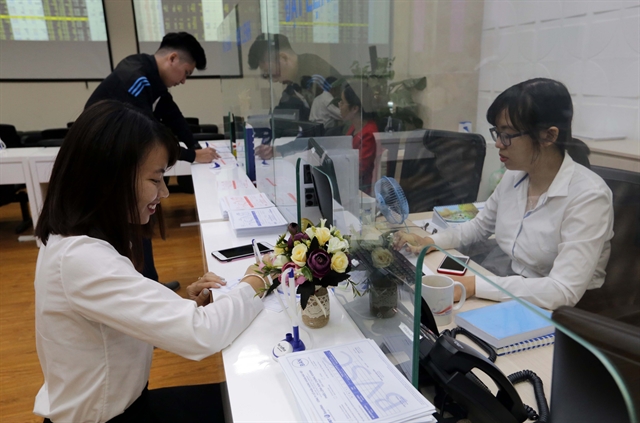Concerns about the US-China trade talks have lifted for now, and investors are turning their attention to third quarter earnings reports and how listed companies will perform in the last three months of the year.

Concerns about the US-China trade talks have lifted for now, and investors are turning their attention to third quarter earnings reports and how listed companies will perform in the last three months of the year.
Local markets have already factored these events in, and foreign investors remain cautious about ongoing international disputes, so stocks are not expected to react strongly over the next few weeks.
Viet Nam’s benchmark VN-Index on the Ho Chi Minh Stock Exchange finished last week at 991.84 points, up total 0.43 per cent from the previous one.
The minor HNX-Index on the Ha Noi Stock Exchange ended last week at 105.26 points, nearly unchanged from the previous week’s end of 105.16 points.
Both indices were weighed down by market caution as investors waited for statements from the two-day US-China trade talks which closed on Friday (local time) in Washington. The two sides reportedly came up with a deal to postpone their dispute, but analysts and businesses remained uncertain about the feasibility of the agreement.
But positive reactions from the US and China last weekend helped boost local market sentiment, easing investor concerns about the potential for a global economic recession.
“The two economies have overcome the most uptight stage of their relationship. They have clearly been willing to sit down and talk to reach an agreement,” Nguyen Trung Du, director of investment services at VNDirect Securities Corp, said.
The developments of the US-China trade relations would definitely have some impact on the Vietnamese market, Ngo The Hien, vice director of the market analysis department at Sai Gon-Ha Noi Securities Corp (SHS), said.
“If a deal is struck, both domestic and international markets will be boosted. If not, it wouldn’t be a disaster for the markets as long as the tensions don’t escalate,” Hien said.
In recent months, the Vietnamese stock market had not been affected that much by the developments of the US-China trade row, so the VN-Index may hang between 980 and 1,000 points, he added.
Foreign investors would continue to be net sellers in risky markets and shelter in safe assets such as government bonds and gold, so it’s difficult to expect a strong wave of capital flowing into the market like the late 2017-early 2018 period, Du from VNDirect said.
Net foreign selling last week reached VND265 billion (US$11.4 million) on the Vietnamese stock market. Despite the figure being down 75 per cent on a weekly basis, it still indicated caution among foreign investors.
Investors were still focused on several listed companies whose stocks were highlighted by their earnings such as banks, consumer firms, retailers and tech companies, he said.
“But those firms’ stocks have been priced in earlier, so they won’t make a big impact on the market when the news is delivered,” Du said.
Investors were eyeing companies’ fourth-quarter and full-year earnings, and those with good nine-month performances were likely to grow in the last quarter, he added.
The banking, retail and tech sectors had provided the momentum in recent weeks. The VN-Index has gained 3.12 per cent since September 11 when investors began looking at companies’ third-quarter profit reports.
During that period, Vietcombank (VCB) has increased 10.5 per cent, tech group FPT Corp (FPT) by 7.4 per cent and dairy producer Vinamilk (VNM) by 6.6 per cent.
The level 1,000-point mark would remain a “mental” challenge for the VN-Index, Du said.
There would be no big difference on how the VN-Index would move in the short term because investors were still doubtful about the strength of the Vietnamese stock market, Nguyen Hoang Viet, senior market analyst at Vietinbank Securities Co, said.
In a bad scenario, the VN-Index may settle at 975 points if it failed to conquer the 1,000-point milestone, he forecast. — VNS





